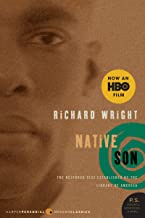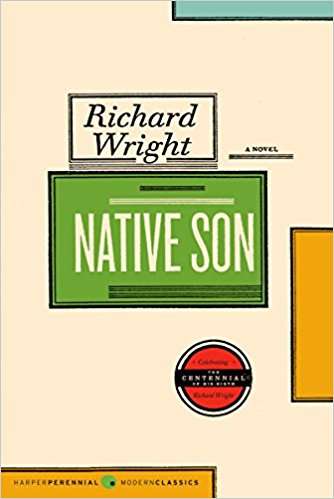Native Son by Richard Wright
Since its publication in 1940, Richard Wright’s controversial novel Native Son (HarperCollins) has been adapted for the stage or screen six times. This latest adaptation of the classic seeks to bring a unique projection of the protagonist “Big” (short for Bigger), while maintaining the famed themes of the novel. In Wright’s book, Bigger is a young black man living in poverty on Chicago’s South Side with his mother, brother and sister in the 1930s. Pressured by his family’s dependence on him to earn money, he is tormented by his lack of options in his segregated world. “We black and they white. They got things and we ain’t. They can do things and we can’t. It’s just like livin’ in jail,” says Bigger. “To Bigger and his kind, white people were not really people; they were a sort of great natural force, like a stormy sky looming overhead, or like a deep swirling river stretching suddenly at one’s feet in the dark.” writes Wright in the novel. Richard Wright knew dozens of Biggers before he started writing Native Son, but he also could draw from his own experience. The author also grew up in poverty, and the origins of his own personal Bigger are described in his 1945 memoir, Black Boy: his many beatings at the hands of his mother, and his constant hunger in the Jim Crow racism of the South. After Wright read a book by H.L. Mencken when he was 15, he decided to become a writer, but after his family moved to Chicago, like Bigger’s, he also resorted to crime to support them. He also wrote and became involved with the Communist Party, which eventually ostracized him because he questioned too many party principles. Along with the obvious themes of racism and inequality, Communism is a prominently featured in Wright’s Native Son. Mary’s party member boyfriend presses on Bigger several pamphlets, including “Race Prejudice on Trial” and “Black and White Unite.” The first stage production was on Broadway in 1941, directed by Orson Welles and with acclaimed actor Canada Lee as Bigger Thomas, Wright’s conflicted main character. The latest incarnation (the third film version) is a contemporary retelling that debuted Jan. 24 at the Sundance Film Festival, with Ashton Durrand Sanders (who played the teenage Chiron in “Moonlight”) as the tragic protagonist. KiKi Layne, fresh from starring in “If Beale Street Could Talk,” plays Bigger’s girlfriend, Bessie. Making his directing debut is conceptual artist Rashid Johnson, whose award-winning works blend black history with pop culture. The script is by Suzan-Lori Parks, who won a Pulitzer for her 2001 play, “Topdog/ Underdog,” also a drama of the struggle of African American men. In the new movie, Big (short for Bigger) has green hair, wears a punk jacket with the words “Or am I freaking out” painted on the back, smokes marijuana and has a gun. In both the book and the movie, Bigger resists pulling off a robbery with his friends, and instead, takes a job as the live-in chauffeur of a wealthy businessman. But he cannot cope with the strangeness of his new situation, accepted by white people who treat him as an equal. His fear leads him to commit two murders and a rape, one murder by accident and one on purpose. The review in Variety calls Big “a twitchy existential brooder in his early 20s who styles himself like a thrift-shop literary gangsta.” (He keeps a copy of Ralph Ellison’s Invisible Man at his bedside.) “Once Big makes his fatal mistake, his goose is cooked, there’s no way out, and the forces gather around him,” the reviewer writes. Another reviewer who saw the film on the opening night of Sundance praised the strong performances from Ashton Sanders and Margaret Qualley as Mary, the daughter of Big’s wealthy employer, “incredible cinematography and some very powerful writing.” James Baldwin famously criticized Wright for perpetuating the stereotype of black men, but also wrote, “No American Negro exists who does not have his private Bigger Thomas living in his skull.” The big question for the latest film adaptation is whether the plot of Native Son is still relevant today. Those who feel that racism and classicism is still an issue would argue that it is. Native Son is now available to purchase.Buy this Book!
Amazon
Genre: Potpourri
Author: Richard Wright
Publisher: Arrow
ISBN: 9781784876130





